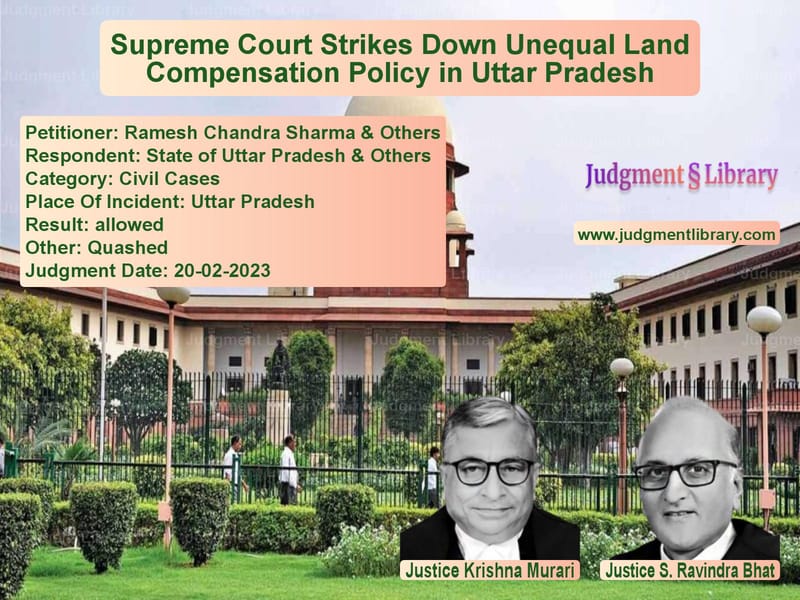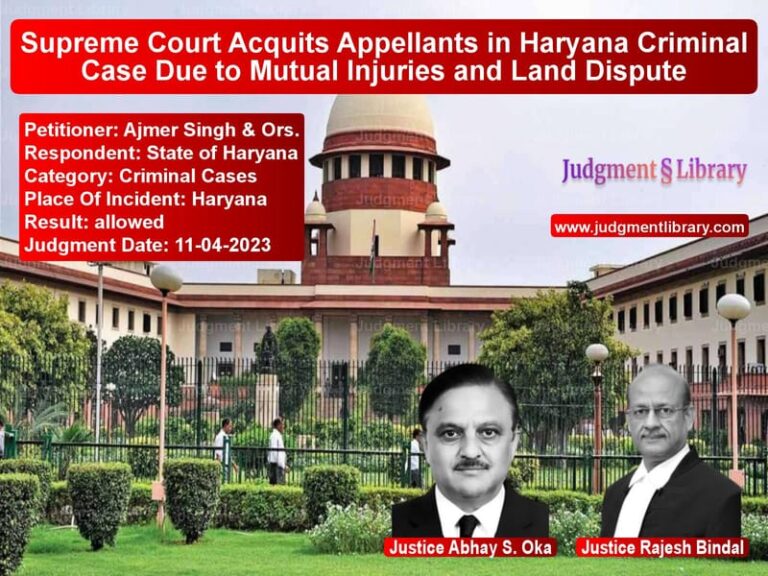Supreme Court Strikes Down Unequal Land Compensation Policy in Uttar Pradesh
The Supreme Court of India, in a landmark ruling on February 20, 2023, delivered a judgment in Ramesh Chandra Sharma & Others vs. State of Uttar Pradesh & Others, declaring unconstitutional the distinction made between ‘Pushtaini’ (ancestral) and ‘Gair-Pushtaini’ (non-ancestral) landowners in compensation for land acquired by the government. The ruling has profound implications for land acquisition laws, ensuring equality in compensation and preventing arbitrary classifications.
Background of the Case
The case arose when landholders in Uttar Pradesh challenged a policy by the Greater Noida Authority (G Noida) and the state government that created two classes of landowners:
- Pushtaini Landholders: Those whose families owned the land before the establishment of the authority (January 28, 1991) or inherited it through partition or settlement.
- Gair-Pushtaini Landholders: Those who purchased land after the authority was established.
Under this policy, ‘Pushtaini’ landowners were granted additional compensation of ₹3 per square yard, a 15% rehabilitation bonus, and 10% of the acquired land, whereas ‘Gair-Pushtaini’ landowners were denied these benefits.
Legal Challenge
The affected landowners filed writ petitions before the Allahabad High Court, arguing that such a classification violated Article 14 of the Constitution (Right to Equality). The High Court upheld the classification, stating that it had a reasonable nexus to the objective of rehabilitating displaced families.
Discontent with this ruling, the landowners escalated the matter to the Supreme Court.
Arguments by the Appellants (Landowners)
- The classification was arbitrary and violated Article 14 of the Constitution.
- Landowners were treated unequally despite their lands being acquired for the same public purpose.
- Merely because some landowners inherited the land should not grant them special privileges.
- Compensation under the Land Acquisition Act, 1894, must be uniform for all landowners.
- The classification had no empirical data or justification to support differential treatment.
Arguments by the Respondents (State of Uttar Pradesh & Greater Noida Authority)
- The policy aimed to rehabilitate ‘Pushtaini’ landowners who had deep-rooted ties to the land.
- ‘Gair-Pushtaini’ landowners were investors and not primary dependents on the land.
- The policy was created to prevent displacement and ensure a fair redistribution of resources.
- The appellants had voluntarily accepted the compensation and could not challenge it later.
Supreme Court’s Observations and Judgment
The Supreme Court struck down the classification, ruling that:
“No distinction can be made between landowners whose lands are acquired for the same public purpose under the same notification.”
Key points from the judgment:
- Violation of Article 14: The distinction was arbitrary and not based on any rational nexus to the objective sought to be achieved.
- Land Acquisition Law Must Be Uniform: Compensation must be based on market value, not the nature of ownership.
- Precedents Cited: The Court relied on Nagpur Improvement Trust vs. Vithal Rao, which held that all landowners in a given acquisition must be treated equally.
- Agreement Cannot Override Fundamental Rights: The Court rejected the argument that landowners had waived their rights by accepting compensation, emphasizing that fundamental rights cannot be waived.
Key Takeaways from the Judgment
- Compensation Cannot Be Arbitrary: The government must treat all landowners equally when acquiring land.
- Rehabilitation Must Be Justified: If rehabilitation benefits are given, they must be based on concrete evidence and not arbitrary classifications.
- Fair Play in Land Acquisition: The ruling sets a precedent ensuring that land acquisition policies are non-discriminatory.
Implications of the Judgment
The judgment is expected to impact land acquisition policies across India, ensuring that all landowners are treated equitably. It also sets a precedent for future cases where compensation is awarded unequally based on arbitrary distinctions.
Conclusion
The Supreme Court’s decision in this case is a significant step towards upholding the principles of fairness and equality in land acquisition. By striking down an arbitrary classification, the Court has reinforced that laws must not create artificial distinctions that unfairly benefit one group over another. This judgment will serve as a guiding principle in ensuring that land acquisition processes remain transparent, just, and constitutionally sound.
Petitioner Name: Ramesh Chandra Sharma & Others.Respondent Name: State of Uttar Pradesh & Others.Judgment By: Justice Krishna Murari, Justice S. Ravindra Bhat.Place Of Incident: Uttar Pradesh.Judgment Date: 20-02-2023.
Don’t miss out on the full details! Download the complete judgment in PDF format below and gain valuable insights instantly!
Download Judgment: ramesh-chandra-sharm-vs-state-of-uttar-prade-supreme-court-of-india-judgment-dated-20-02-2023.pdf
Directly Download Judgment: Directly download this Judgment
See all petitions in Property Disputes
See all petitions in Damages and Compensation
See all petitions in Judgment by Krishna Murari
See all petitions in Judgment by S Ravindra Bhat
See all petitions in allowed
See all petitions in Quashed
See all petitions in supreme court of India judgments February 2023
See all petitions in 2023 judgments
See all posts in Civil Cases Category
See all allowed petitions in Civil Cases Category
See all Dismissed petitions in Civil Cases Category
See all partially allowed petitions in Civil Cases Category







